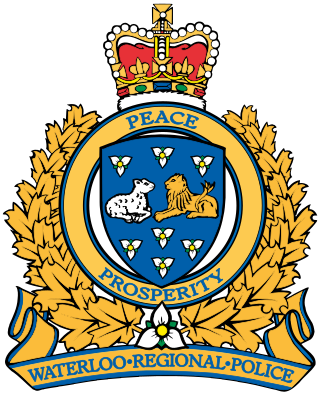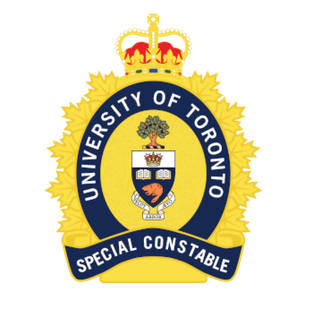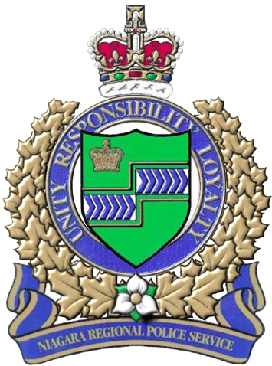
Brampton is a city in the Canadian province of Ontario, and the regional seat of the Regional Municipality of Peel. It is part of the Greater Toronto Area (GTA) and is a lower-tier municipality within the Peel Region. The city has a population of 656,480 as of the 2021 Census, making it the ninth most populous municipality in Canada and the third most populous city in the Greater Golden Horseshoe urban area, behind Toronto and Mississauga. The City of Brampton is bordered by Vaughan to the east, Halton Hills to the west, Caledon to the north, Mississauga to the south, and Etobicoke (Toronto) to the southeast.

The Regional Municipality of Peel is a regional municipality in the Greater Toronto Area, Southern Ontario, Canada. It consists of three municipalities to the west and northwest of the city of Toronto: the cities of Mississauga and Brampton, and the town of Caledon, each of which spans its full east–west width. The regional seat is in Brampton.

The Ontario Provincial Police (OPP) is the provincial police service of Ontario, Canada. The OPP patrols provincial highways and waterways; protects provincial government buildings and officials, with the exception of the legislative precinct; patrols unincorporated areas in northern Ontario; provides training, operational support, and funding to some Indigenous police forces; and investigates complex or multi-jurisdictional crimes across the province. The OPP also has a number of local mandates through contracts with municipal governments and First Nations, where it acts as the local police force and provides front-line services.

Brampton Transit (BT) is a public transport bus operator for the City of Brampton in the Regional Municipality of Peel, and within the Greater Toronto Area (GTA) in Ontario, Canada. Brampton Transit began operations in 1974. In 2023, the system had a ridership of 49,200,800, or about 226,500 per weekday as of the third quarter of 2024.

The Toronto Police Service (TPS) is a municipal police force in Toronto, Ontario, Canada, and the primary agency responsible for providing law enforcement and policing services in Toronto. Established in 1834, it was the first local police service created in North America and is one of the oldest police services in the English-speaking world.

The York Regional Police (YRP) is the police service of the Regional Municipality of York, Ontario, Canada. YRP was formed in 1971 from the police forces maintained by the nine municipalities which amalgamated into York Region at the time. The force employs over 1,500 sworn members and 618 unsworn members as of 2015.

The Waterloo Regional Police Service (WRPS) provides policing services for the Regional Municipality of Waterloo in Ontario, Canada, which encompasses the cities of Waterloo, Kitchener, and Cambridge, as well as the townships of North Dumfries, Wellesley, Wilmot and Woolwich. The WRPS was established in 1973, to replace the individual police departments in the region. The cities of Kitchener, Waterloo and Galt; the towns of Preston, Hespeler, Elmira and New Hamburg; the Village of Bridgeport and Waterloo Township had their own respective police department. The townships of Woolwich, Wellesley, Wilmot and North Dumfries were under the jurisdiction of the Ontario Provincial Police. In 1991 the Waterloo Regional Police Force was renamed to their current name.

The University of Toronto Campus Safety Special Constable Service is a special constabulary that provides police services to the three campuses of the University of Toronto. The Service was formed in 1904, and, as of 2022, serves roughly 97 000 students and 25 000 faculty and staff.

The Niagara Regional Police Service (NRPS) is a regional police service maintained by the Regional Municipality of Niagara in the Canadian province of Ontario. As of 2021, the force employed 774 sworn police officers and 326 non-sworn support staff members.

Susan Fennell is a Canadian politician, who served as the mayor of Brampton, Ontario from 2000 to 2014. She was also the founder and commissioner of the National Women's Hockey League. In 2021, the City of Brampton named the Susan Fennell Sportsplex after her.

Law enforcement in Canada is the responsibility of police services, special constabularies, and civil law enforcement agencies, which are operated by every level of government, some private and Crown corporations, and First Nations. In contrast to the United States or Mexico, and with the exception of the Unité permanente anticorruption in Quebec and the Organized Crime Agency of British Columbia, there are no organizations dedicated exclusively to the investigation of criminal activity in Canada. Criminal investigations are instead conducted by police services, which maintain specialized criminal investigation units in addition to their mandate for emergency response and general community safety.

Toronto Gore is a former incorporated and now geographic township in Ontario, Canada. It is today split between Mississauga and Brampton.

Following is an outline is for the history of Brampton, the fourth largest city in Ontario, Canada. European settlers arrived began to settle the area in the early 19th century, with Brampton being formally incorporated into a village in 1853.

The A. Grenville and William Davis Courthouse opened in 2000, and is located at 7755 Hurontario Street in Brampton, Ontario, Canada.

Peel Regional Paramedic Services, provide ambulatory and paramedic care for the municipalities within Peel Region, in Ontario, Canada. Paramedic Headquarters are located in Brampton at 1600 Bovaird Road east and operations serve the residents of Caledon, Brampton, and Mississauga.
Peter Robertson was mayor of Brampton, Ontario from 1991 to 2000. In 2000, he was defeated in the municipal election by then-councillor Susan Fennell.
The COVID-19 pandemic was a viral pandemic of coronavirus disease 2019 (COVID-19), a novel infectious disease caused by severe acute respiratory syndrome coronavirus 2 (SARS-CoV-2). The pandemic has affected the Cities of Mississauga and Brampton, and the Town of Caledon, within the Regional Municipality of Peel. As part of the larger closure decisions in Ontario, a stay-at-home order shuttered all nonessential businesses, and caused event cancellations.

Nishan Duraiappah is a Canadian police officer who is the current Chief of Police with the Peel Regional Police, which serves the cities of Brampton and Mississauga with over 1.6 million residents. He was sworn in as Chief of Peel Regional Police in October 2019.




































